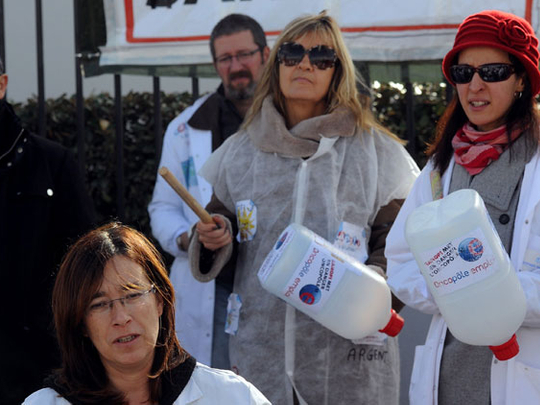
Paris: France’s central bank said it expected the Eurozone’s second-largest economy to slip into recession as 2012 ends — a scenario that could make it harder for the government to hit next year’s debt-reduction targets.
The Bank of France, which had already predicted gross domestic product would shrink 0.1 per cent in the third quarter, said on Friday it was now expecting a similar 0.1 per cent decline in the last three months of 2012 as well.
Economists said the news showed the Socialist government was being optimistic in forecasting growth of 0.8 per cent next year, especially when it also hopes that the biggest post-war budget cutbacks will slash the public deficit to 3.0 per cent of GDP, from an estimated 4.5 per cent this year.
“It’s not looking good,” said Nicolas Bouzou at economics consultancy Asteres. “There’s a real inconsistency in the government’s policies. They’re creating a recession, and the growth-boosting policies will only come in afterwards.”
Michel Martinez, an economist at Societe Generale bank, said the government would have to respond to the downturn even if it was likely to be much milder than in spots like Spain or Italy.
“It’s a political choice,” he said. “They’re going to find themselves with two options. Either they forget about more budget tightening and miss the budget target, which risks damaging France’s image with markets, or they correct the budget,” he said.
Budget savings
President Francois Hollande’s Socialist government forecasts 0.8 per cent growth in 2013 after 0.3 per cent in 2012, and hopes that €30 billion of budget savings — comprising spending cuts of 10 billion and tax rises of 20 billion — will allow it to meet its European commitments on deficit reduction.
The risk, economists say, is that it cannot do both.
GDP stopped growing in the last quarter of 2011 and stayed at zero in the first and second quarters, according to the most recent official estimates available.
Economists polled by Reuters are on average predicting zero growth again in the third quarter when official estimates for that period are published on November 15.
The statistics office reported a poor finish to that quarter on Friday, with overall industrial output dropping a hefty 2.7 per cent in September after a 1.9 per cent rise in August.
In the manufacturing sector alone, output fell 3.2 per cent in September, after August’s 2.1 per cent rise, the statistics office, INSEE, said.
That may suggest the Bank of France’s gloomy forecasts for the end of the year are closer to reality than French Finance Minister Pierre Moscovici, who recently said he expected the economy to grow slightly in the third quarter of 2012, while INSEE predicts zero growth.
Bank of France chief Christian Noyer, speaking in regional media interviews before Friday’s statement from the central bank, said the government was right to target a deficit of three per cent in 2013 and that he was confident.
Restore confidence
“It’s a mark of French economic credibility,” Noyer told Vosges Matin and other eastern French newspapers. “Growth will recover gradually during the course of 2013 if we can restore confidence in Europe and France,” he said.
While the government predicts 0.3 per cent GDP growth this year and 0.8 per cent growth in 2013, the European Commission reduced its predictions for France earlier this week, to 0.2 per cent and 0.4 per cent respectively in 2012 and 2013. The Bank of France does not make predictions of annual growth.
Torn between the need to reduce its deficit and reboot a stalled economy, Hollande’s government unveiled plans this week to reduce companies’ labour costs by six per cent per year to help restore waning competitiveness on world markets, measures to be funded in part by rises in VAT sales tax from the start of 2014.
Bouzou at the Asteres consultancy said the government might now need to accelerate implementation of that package.
“The difficulty France is going to have now is that southern European countries have become more price-competitive so their recovery will in part be at our expense,” he said.











